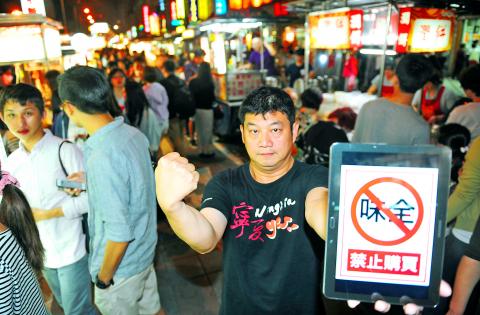The government promised yesterday to “do all it can,” including toughening laws and punishing “black-hearted” entrepreneurs, to restore people’s confidence in the nation’s food safety system.
In response to the second open letter by “an angry citizen,” who published their complaint in the form of a front-page Apple Daily advertisement, the Executive Yuan said that it “will absolutely not evade its responsibility and will keep making efforts endlessly.”
The angry citizen, in their letter titled “Letter to Premier Jiang Yi-huah (江宜樺),” accused the government led by Jiang and President Ma Ying-jeou (馬英九) of failing to ease people’s concerns over food safety since the “toxic starch” scandal in May last year, in which Uni-President Enterprises Corp was involved, but escaped unscathed.

Photo: Lo Pei-der, Taipei Times
A series of food safety scandals have continued to rock the nation and its neighboring countries, including October last year’s “black-hearted oil” incident, in which copper chlorophyll was found in adulterated edible oil.
The two top government leaders’ response to the scandal was also published in yesterday’s issue of the Chinese-language Apple Daily, in which Ma said: “It only hurts our feelings, not our bodies,” and Jiang said: “Like every one of you, I’m worried about food safety, so in my home, we use only imported olive oil.”
“The responses from both of you to these incidents have flabbergasted the public, hurting not only their feelings, but also their physical health,” the citizen said.
The citizen went on to accuse the government of not doing enough to punish law-breaking businesspeople and not alleviating people’s concerns about food safety in Taiwan.
The citizen expanded their complaints to the government’s missteps over the past few years in terms of economic development, social order, labor rights and information security.
In response, Executive Yuan spokesperson Sun Lih-chyun (孫立群) yesterday said the government is as worried about food safety and other issues as the general public.
“The Executive Yuan has speedily introduced eight measures to combat the food safety scandals, including increasing fines imposed on culprits, hiking cash rewards for those alerting the authorities and establishing a hotline for public tipoffs,” Sun said.
The other five measures are beefing up controls of all oil products, managing the recycling of used oils, enforcing the existing three-layer quality control system, tracking the sources and manufacturing processes for all food items and reforming the goods manufacturing practice system for the food industry.
Sun said the government has not finished its crackdown on illegal manufacturers.
“We’ve been referring all suspected businesses to the relevant authorities, based on the evidence collected thus far,” Sun said.
“We will pursue all law-breaking cases to the end, bringing justice to all, no matter how big the suspected conglomerates are and how big a share they enjoy of the consumer market,” he said.
Admitting that there will be “pains” during the crackdown, Sun said: “The government is determined to set Taiwan’s food industry on a new track and restore people’s confidence in food safety.”

The manufacture of the remaining 28 M1A2T Abrams tanks Taiwan purchased from the US has recently been completed, and they are expected to be delivered within the next one to two months, a source said yesterday. The Ministry of National Defense is arranging cargo ships to transport the tanks to Taiwan as soon as possible, said the source, who is familiar with the matter. The estimated arrival time ranges from late this month to early next month, the source said. The 28 Abrams tanks make up the third and final batch of a total of 108 tanks, valued at about NT$40.5 billion

Two Taiwanese prosecutors were questioned by Chinese security personnel at their hotel during a trip to China’s Henan Province this month, the Mainland Affairs Council (MAC) said yesterday. The officers had personal information on the prosecutors, including “when they were assigned to their posts, their work locations and job titles,” MAC Deputy Minister and spokesman Liang Wen-chieh (梁文傑) said. On top of asking about their agencies and positions, the officers also questioned the prosecutors about the Cross-Strait Joint Crime-Fighting and Judicial Mutual Assistance Agreement, a pact that serves as the framework for Taiwan-China cooperation on combating crime and providing judicial assistance, Liang

A group from the Taiwanese Designers in Australia association yesterday represented Taiwan at the Midsumma Pride March in Melbourne. The march, held in the St. Kilda suburb, is the city’s largest LGBTQIA+ parade and the flagship event of the annual Midsumma Festival. It attracted more than 45,000 spectators who supported the 400 groups and 10,000 marchers that participated this year, the association said. Taiwanese Designers said they organized a team to march for Taiwan this year, joining politicians, government agencies, professionals and community organizations in showing support for LGBTQIA+ people and diverse communities. As the first country in Asia to legalize same-sex

MOTIVES QUESTIONED The PLA considers Xi’s policies toward Taiwan to be driven by personal considerations rather than military assessment, the Epoch Times reports Chinese President Xi Jinping’s (習近平) latest purge of the Chinese People’s Liberation Army (PLA) leadership might have been prompted by the military’s opposition to plans of invading Taiwan, the Epoch Times said. The Chinese military opposes waging war against Taiwan by a large consensus, putting it at odds with Xi’s vision, the Falun Gong-affiliated daily said in a report on Thursday, citing anonymous sources with insight into the PLA’s inner workings. The opposition is not the opinion of a few generals, but a widely shared view among the PLA cadre, the Epoch Times cited them as saying. “Chinese forces know full well that